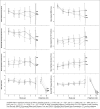Follow-up evaluation of cognitive function in the randomized Alzheimer's Disease Anti-inflammatory Prevention Trial and its Follow-up Study - PubMed (original) (raw)
Randomized Controlled Trial
Follow-up evaluation of cognitive function in the randomized Alzheimer's Disease Anti-inflammatory Prevention Trial and its Follow-up Study
ADAPT-FS Research Group. Alzheimers Dement. 2015 Feb.
Abstract
Objective: The Alzheimer's Disease Anti-Inflammatory Prevention Trial (ADAPT) and Follow-up Study (ADAPT-FS) examined effects of naproxen and celecoxib on cognition in the elderly. We report here results describing trajectories of cognitive evaluation test scores.
Methods: A total of 2356 participants completed baseline and at least one follow-up cognitive evaluation between 2001 and 2004. Study treatments were discontinued in 2004, but participants were followed until 2007. A total of 1537 participants were reevaluated in 2010 to 2011. Outcomes include seven cognitive evaluations administered yearly in person in ADAPT and three of these evaluations that were administered by telephone near the end of ADAPT and again in ADAPT-FS.
Results: There were no important differences over time by treatment group on any ADAPT cognitive measure, a global composite, or the three cognitive measures reassessed in ADAPT-FS by telephone.
Conclusions: Treatment for 1 to 3 years with naproxen or celecoxib did not protect against cognitive decline in older adults with a family history of AD.
Trial registration: ClinicalTrials.gov NCT00007189 NCT01417130.
Keywords: Alzheimer's disease; Celecoxib; Clinical trial; Cognitive function; Naproxen; Nonsteroidal anti-inflammatory drug; Prevention.
Copyright © 2015 The Alzheimer's Association. All rights reserved.
Figures
Figure 1
Raw scores for each of the 7 tests of cognitive function and the global summary over time
Figure 2
Global summary and 3MS-E by dementia diagnosis (during ADAPT or ADAPT-FS)
Similar articles
- Results of a follow-up study to the randomized Alzheimer's Disease Anti-inflammatory Prevention Trial (ADAPT).
Alzheimer's Disease Anti-inflammatory Prevention Trial Research Group. Alzheimer's Disease Anti-inflammatory Prevention Trial Research Group. Alzheimers Dement. 2013 Nov;9(6):714-23. doi: 10.1016/j.jalz.2012.11.012. Epub 2013 Apr 3. Alzheimers Dement. 2013. PMID: 23562431 Free PMC article. Clinical Trial. - Cognitive function over time in the Alzheimer's Disease Anti-inflammatory Prevention Trial (ADAPT): results of a randomized, controlled trial of naproxen and celecoxib.
ADAPT Research Group; Martin BK, Szekely C, Brandt J, Piantadosi S, Breitner JC, Craft S, Evans D, Green R, Mullan M. ADAPT Research Group, et al. Arch Neurol. 2008 Jul;65(7):896-905. doi: 10.1001/archneur.2008.65.7.nct70006. Epub 2008 May 12. Arch Neurol. 2008. PMID: 18474729 Free PMC article. Clinical Trial. - Effects of non-steroidal anti-inflammatory drug treatments on cognitive decline vary by phase of pre-clinical Alzheimer disease: findings from the randomized controlled Alzheimer's Disease Anti-inflammatory Prevention Trial.
Leoutsakos JM, Muthen BO, Breitner JC, Lyketsos CG; ADAPT Research Team. Leoutsakos JM, et al. Int J Geriatr Psychiatry. 2012 Apr;27(4):364-74. doi: 10.1002/gps.2723. Epub 2011 May 10. Int J Geriatr Psychiatry. 2012. PMID: 21560159 Free PMC article. Clinical Trial. - Screening for Cognitive Impairment in Older Adults: An Evidence Update for the U.S. Preventive Services Task Force [Internet].
Lin JS, O'Connor E, Rossom RC, Perdue LA, Burda BU, Thompson M, Eckstrom E. Lin JS, et al. Rockville (MD): Agency for Healthcare Research and Quality (US); 2013 Nov. Report No.: 14-05198-EF-1. Rockville (MD): Agency for Healthcare Research and Quality (US); 2013 Nov. Report No.: 14-05198-EF-1. PMID: 24354019 Free Books & Documents. Review. - The Alzheimer's prevention initiative composite cognitive test score: sample size estimates for the evaluation of preclinical Alzheimer's disease treatments in presenilin 1 E280A mutation carriers.
Ayutyanont N, Langbaum JB, Hendrix SB, Chen K, Fleisher AS, Friesenhahn M, Ward M, Aguirre C, Acosta-Baena N, Madrigal L, Muñoz C, Tirado V, Moreno S, Tariot PN, Lopera F, Reiman EM. Ayutyanont N, et al. J Clin Psychiatry. 2014 Jun;75(6):652-60. doi: 10.4088/JCP.13m08927. J Clin Psychiatry. 2014. PMID: 24816373 Free PMC article. Review.
Cited by
- Association of Chronic Low-grade Inflammation With Risk of Alzheimer Disease in ApoE4 Carriers.
Tao Q, Ang TFA, DeCarli C, Auerbach SH, Devine S, Stein TD, Zhang X, Massaro J, Au R, Qiu WQ. Tao Q, et al. JAMA Netw Open. 2018 Oct 5;1(6):e183597. doi: 10.1001/jamanetworkopen.2018.3597. JAMA Netw Open. 2018. PMID: 30646251 Free PMC article. - The gut microbiota in neurodegenerative diseases: revisiting possible therapeutic targets for cannabidiol.
Oliveira BSA, Milanezi DS, Gonzaga PDV, Detoni FR, Soriano RN. Oliveira BSA, et al. Heliyon. 2022 Dec 8;8(12):e12172. doi: 10.1016/j.heliyon.2022.e12172. eCollection 2022 Dec. Heliyon. 2022. PMID: 36544841 Free PMC article. Review. - Immunity in amyotrophic lateral sclerosis: blurred lines between excessive inflammation and inefficient immune responses.
Béland LC, Markovinovic A, Jakovac H, De Marchi F, Bilic E, Mazzini L, Kriz J, Munitic I. Béland LC, et al. Brain Commun. 2020 Aug 13;2(2):fcaa124. doi: 10.1093/braincomms/fcaa124. eCollection 2020. Brain Commun. 2020. PMID: 33134918 Free PMC article. Review. - Safety and efficacy of sargramostim (GM-CSF) in the treatment of Alzheimer's disease.
Potter H, Woodcock JH, Boyd TD, Coughlan CM, O'Shaughnessy JR, Borges MT, Thaker AA, Raj BA, Adamszuk K, Scott D, Adame V, Anton P, Chial HJ, Gray H, Daniels J, Stocker ME, Sillau SH. Potter H, et al. Alzheimers Dement (N Y). 2021 Mar 24;7(1):e12158. doi: 10.1002/trc2.12158. eCollection 2021. Alzheimers Dement (N Y). 2021. PMID: 33778150 Free PMC article.
References
- Szekely CA, Town T, Zandi PP. NSAIDs for the chemoprevention of Alzheimer's disease. Subcell Biochem. 2007;42:229–248. - PubMed
- Rozzini R, Ferrucci L, Losonczy K, Havlik RJ, Guralnik JM. Protective effect of chronic NSAID use on cognitive decline in older persons. J Am Geriatr Soc. 1996;44:1025–1029. - PubMed
- Jonker C, Comijs HC, Smit JH. Does aspirin or other NSAIDs reduce the risk of cognitive decline in elderly persons? Results from a population-based study. Neurobiol Aging. 2003;24:583–588. - PubMed
- Gray SL, Hanlon JT, Landerman LR, Artz M, Schmader KE, Fillenbaum GG. Is antioxidant use protective of cognitive function in the community-dwelling elderly? Am J Geriatr Pharmacother. 2003;1:3–10. - PubMed
- Hayden KM, Zandi PP, Khachaturian AS, et al. Does NSAID use modify cognitive trajectories in the elderly? The Cache County study. Neurology. 2007;69:275–282. - PubMed
Publication types
MeSH terms
Substances
LinkOut - more resources
Full Text Sources
Other Literature Sources
Medical

